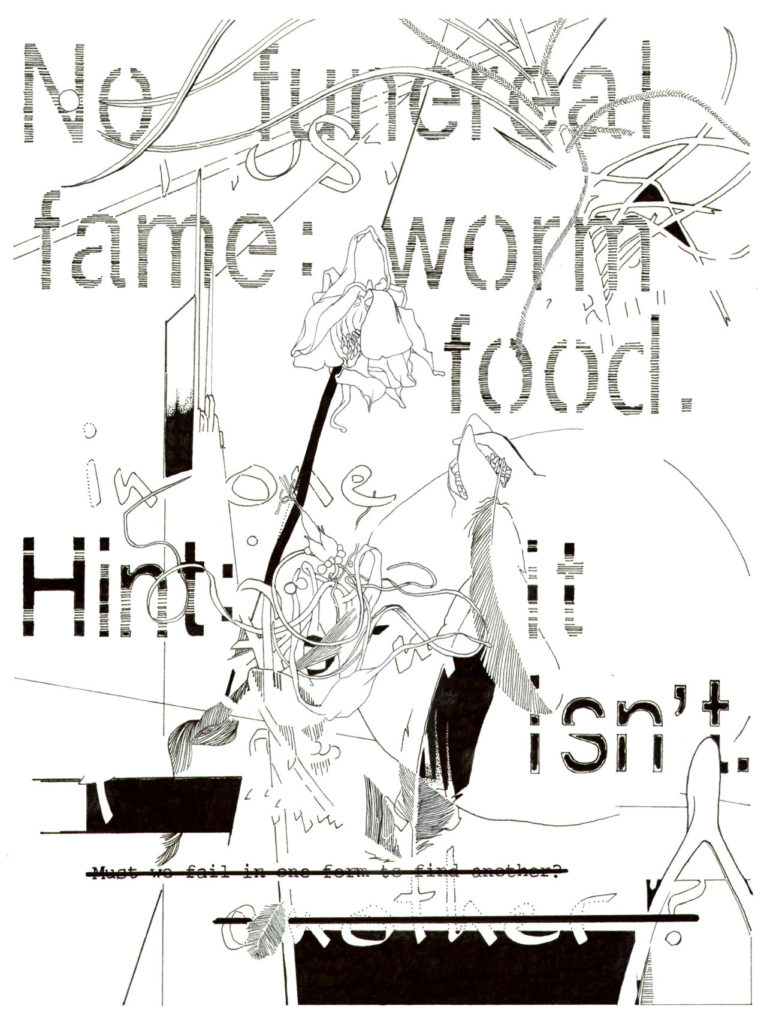Blessèd Delusions: Literary Follies and Visual Poems
by Dora Malech
This essay is part of the series On Failure.
On some level, for me, poetic form is always a failure of magic and prayer, “efficacious words”[1] rendered undeliverable in a larger sense—faithless or profane or misdirected, loosed and lost from a sacred context. The “literary follies”[2] (anagrams, lipograms, redactions, erasures) of my recent book, Stet, are failures of both traditional poetic form and traditional narrative. And the visual poems that wove through and then out of and then beyond the process of writing Stet are failures of language to speak for itself.
In translating a poem by Antonio Machado, Robert Bly gives us the phrase “marvelous error,” itself a kind of marvelous error, an imperfect rendering of the original:
Anoche cuando dormía
soñé ¡bendita ilusión!
“Blessèd delusion” would be more faithful, perhaps? Or illusion, hope, dream, vision. Sometimes my mind misremembers the Bly translation as “beautiful mistake,” which I like too. What remains in each iteration is the sense of contradiction and the truth therein, of embracing or welcoming or reveling in what should, in a different context, be discounted or corrected.
Deleuze writes: “Creative stuttering is what makes language grow from the middle, like grass; it is what makes language a rhizome instead of a tree, what puts language in a state of perpetual disequilibrium: Ill Seen, Ill Said (content and expression).”[3] Here, he’s referring to Beckett, whose lines from Worstword Ho give us one of the most succinct and memorable takes on failure: “Fail again. Fail better.” Let’s not entirely detach what has become an unlikely entrepreneurial mantra from the darkness of Beckett’s vision.
First I thought Stet would fail to be a book, and now that it has failed to fail and exists in the world, its forms and processes are failing to stay put between its front and back covers. I see the shadows of its intentions when I return to earlier work, and I find myself writing phrases and lines that would belong in Stet if I could go back in time and put them there. My visual pieces have become a kind of repository for its process and excess and uncertainty and unfinished business—dead letter office, or bargain bin, or genizah—though this explanation of the visual poems coming into being “after” Stet is not quite right; I have been working on them for years, and their obsessive methods far predate those of Stet for me. In some sense, Stet channeled their visual concerns imperfectly into language.
When I read some poems from Stet in public recently, an elder in the field came up to me afterward and said it would be nice to get coffee and chat. The older writer said something along the lines of, “I’d like to tell you why I used to be interested in things like that too, and why I’m not anymore.” I assume “things like that” meant constrained form or experimental form or language play or non-narrative work or—I’m not sure. I said it would be nice and the more I think about it the more I think it would be. I like to hear about trajectories, about change over time. How much better is the title “Where Are You Going, Where Have You Been?” than “Death and the Maiden”? I’m choosing to embrace the likelihood that I’m making art right now that I won’t be making later. Or won’t be making later in just the same way, even if I keep circling and returning. Which is to say, these are the mistakes (beautiful or otherwise) that only I can make, and I can only make right now.

[1] Hugh Kenner, “Magic and Spells,” in The Ordering Mirror: Readers and Contexts (New York, NY: Fordham University Press, 1993), 183.
[2] Isaac Disraeli. “Curiosities of Literature, Vol. 1,” in The Works of Isaac Disraeli, Vol. 1., ed. Benjamin Disraeli (London: Frederick Warne and Co., 1866), 293.
[3] Gilles Deleuze, “He Stuttered,” in Gilles Deleuze and the Theater of Philosophy, trans. Constantin V. Boundas and Dorothea Olkowski (London: Routledge, 1994), 4.
Dora Malech is the author of Stet (Princeton University Press, 2018), Say So (Cleveland State University Poetry Center, 2011), and Shore Ordered Ocean (The Waywiser Press, 2009). Her fourth book of poems, Flourish, is forthcoming from Carnegie Mellon University Press in 2020. Her poems have appeared in publications that include The New Yorker, The Best American Poetry, and Tin House, and her visual art has appeared in Poetry and Pinwheel. She lives in Baltimore, Maryland, where she is an assistant professor in The Writing Seminars at Johns Hopkins University.
About the Series
On Failure is conceived by Keetje Kuipers and the editors of Poetry Northwest, featuring essays from a range of poets that investigate the practice of failure, both as poet and citizen. Each featured writer will present a work of their own that they see as a failure, and offer a chance to peek behind the curtain at their creative process.
